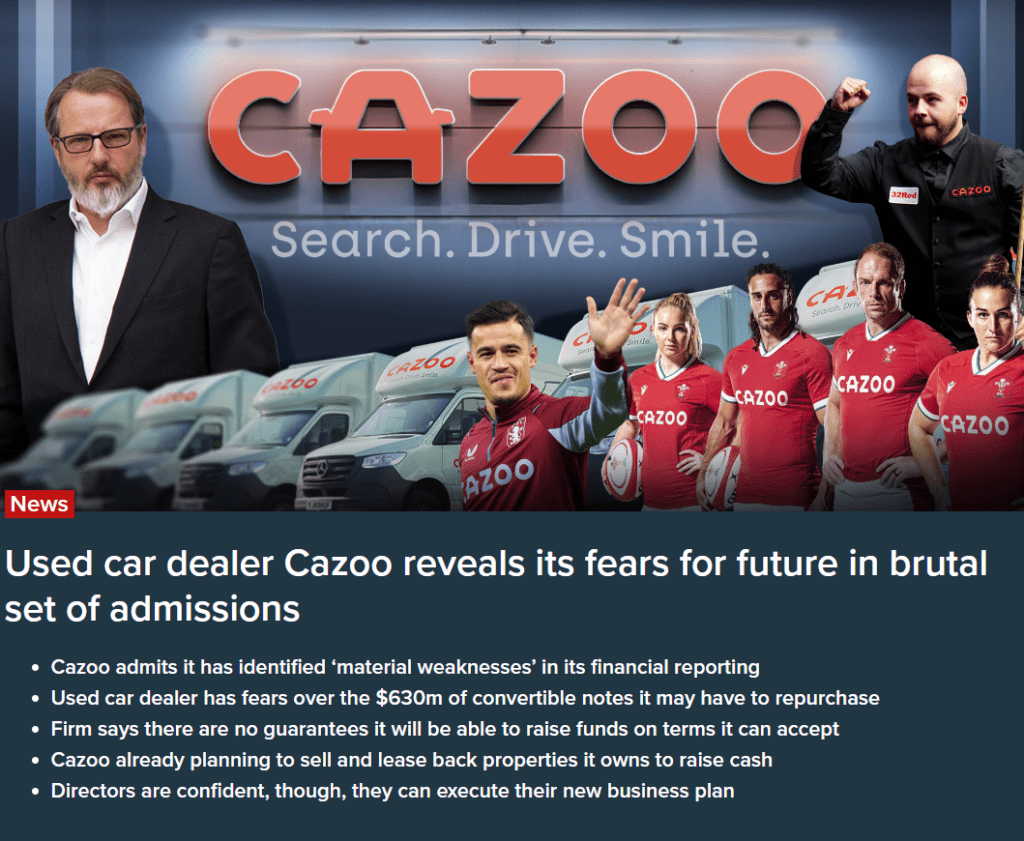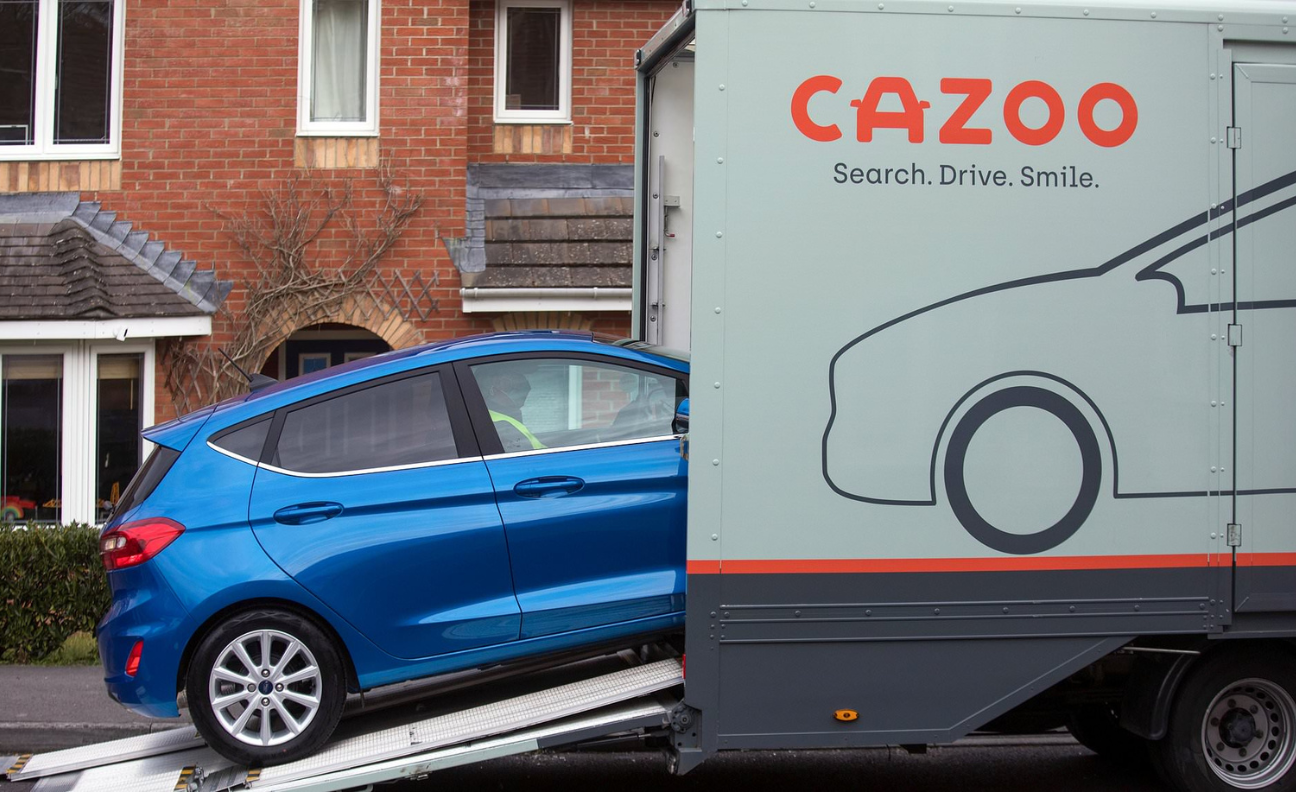Cazoo Holdings Ltd, a leading player in the used car dealership industry, has recently made significant revelations in its annual accounts, shedding light on the company’s deep concerns regarding its future operations.
These disclosures provide crucial insights into Cazoo’s challenges and underscores the urgent need for the successful execution of its realignment plan.
With material weaknesses in financial reporting, convertible note concerns, looming financial challenges, and strategic shifts, Cazoo must navigate a complex landscape to ensure its long-term viability.
Realignment Plan: A Pivotal Factor for Long-Term Success
Cazoo emphasises the criticality of its realignment plan, which outlines its strategic shift from maximising market share in both the United Kingdom and mainland Europe to focusing exclusively on the UK market while improving unit economics.
The company acknowledges material weaknesses in its internal control over financial reporting for the fiscal years ended December 2022 and 2021, which could lead to material misstatements in financial statements or failure to meet reporting obligations.
Therefore, it has been made clear that the remediation of these weaknesses is paramount to ensuring accurate and timely financial reporting, safeguarding Cazoo’s business operations and stakeholder confidence.

Financial Performance and Convertible Notes: Balancing Losses and Liabilities
Cazoo’s annual accounts provide a comprehensive overview of its financial performance in 2022, revealing a substantial loss of £839 million, surpassing previous reports. Against revenues of £1.24 billion, this loss underscores the challenges faced by the company.
Additionally, Cazoo expresses concerns about the $630 million-worth of convertible notes issued to investors in February of the previous year. If Cazoo’s shares were to be delisted from the New York Stock Exchange (NYSE), the company may be obliged to repurchase these notes.
Furthermore, the current share price of $1.25, perilously close to the NYSE’s $1 limit, adds to the urgency of stabilising share prices to maintain the company’s position on the exchange.
Looming Financial Challenges and the Going Concern Status
Cazoo’s stocking facilities, valued at £240 million at the end of 2022, pose additional concerns as they lack a fixed end date. The company has undertaken various stress tests to evaluate its ability to operate as a going concern.
While current projections indicate £80 million remaining by April next year if plans and budgets for 2023 are met, stress tests considering slight margin increases and higher overheads suggest a potential decrease to as low as £30 million.
In response to this, Cazoo is actively exploring options such as selling and leasing back its owned properties to raise funds and ensure adequate liquidity.
Challenges in Strategy Implementation and Potential Funding Issues
Cazoo’s annual accounts shed light on the risks and uncertainties identified as part of its principal risk assessment. The company acknowledges the impact of its business realignment plan, winding down mainland Europe operations, and the revised 2023 strategy, which shifts focus exclusively to the UK market.
However, Cazoo also recognises the potential challenges in implementing this strategy, potentially having a material adverse effect on its business and operational results.
Furthermore, the company acknowledges the prospect of requiring additional funds, although not anticipated until the second half of next year. The availability of such funding, however, remains uncertain and could pose further challenges to Cazoo’s financial stability.
Contingency Measures and Potential Implications
The company has already implemented significant measures as part of its 2023 business plan to address financial challenges, with these measures including job cuts, the closure of customer centres, a reduction in the number of preparation sites, and divestments of business operations in Italy, Spain, and Germany.
Moreover, Cazoo has also taken steps to streamline its operations by shutting down its UK car subscription business and selling its data business, Cazana. These strategic actions aim to optimise operations, reduce costs, and enhance overall efficiency.
Alarming Figures in Annual Report
In a statement concerning Cazoo’s recently released annual report, a partner at UHY Hacker Young, the accountancy firm, expressed his concerns over the company’s financial situation. The partner remarked that the filed accounts make grim reading with the fast-paced expansion going into reverse, necessitating the recording of a truly staggering loss in excess of £800m.
They further highlighted specific figures, noting that £186m was attributed to discontinued operations, particularly the ill-fated European expansion, and £299m was written off as goodwill from acquisitions, reducing it to zero.
However, it was also mentioned that positive aspects, such as healthy cash reserves of £258m at the end of December and various liquidity options, including £66m in assets held for resale, £49m in subscription vehicles, and the potential for a sale and leaseback of freehold properties, was commendable, though only £16m is currently recorded in the balance sheet.
Nevertheless, UHY cautioned that losing the NYSE listing status could trigger the repayment of the convertible loan, a scenario that investors must surely be considering given the company’s significant remaining liquidity.
Investor Concerns and Mitigation Efforts
While the disclosure of risks and uncertainties is common in annual reports, the scope and seriousness of Cazoo’s challenges will undoubtedly be a cause for concern among investors.
The company’s transparency in identifying these risks and its proactive approach in implementing cost-cutting measures are commendable.
However, the road ahead remains uncertain, and careful strategic decision-making will be instrumental in charting a path towards sustainable growth.
Conclusion
Cazoo’s annual accounts reveal a series of significant challenges and strategic imperatives that will shape the company’s future prospects. The successful execution of its realignment plan, remediation of material weaknesses, stabilisation of share prices, and effective management of financial challenges are crucial for long-term viability.
By addressing these concerns head-on and leveraging its strengths, Cazoo can navigate the complex landscape of the used car dealership industry and strive to secure its position as a leader.
Despite the uncertainties, the company’s transparency, contingency measures, and strategic actions demonstrate its commitment to adapt and overcome challenges. As Cazoo continues its journey towards stability and growth, prudent decision-making and strong execution will be key to realising its long-term vision and success in the future.









